
Research shows that almost every person experiences fatigue at some point, whether it's a nurse after a 12-hour shift, a parent with a newborn, or an office worker in a high-stress job.
And, with energy supplements in increasingly high demand, it’s no wonder more and more people are looking for natural ways to boost energy.
But what causes fatigue or low energy? And what are the best herbs to help boost energy?
We’ll discuss these questions in greater detail, along with seven popular herbs for energy. We’ll also examine how Chinese herbs, in conjunction with a healthy lifestyle, can help elevate energy levels naturally, and for the long term – safely and effectively.
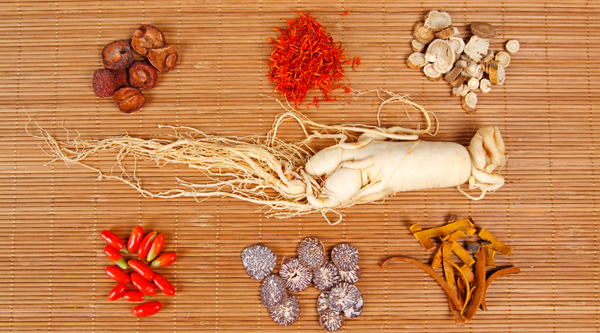
What are the best herbs for energy?
Among some of the best herbs for energy are: Ren Shen, Huang Qi, Dang Shen, Ci Wu Jia, Ling Zhi (Reishi), Chong Cao (Cordyceps), Tai Zi Shen.
Additionally, energy-boosting formulas include: Bu Zhong Yi Qi Tang, Si Jun Zi Tang, Shi Quan Da Bu Tang, Liu Wei Di Huang Wan, Huan Shao Dan, and Ren Shen Yang Rong Tang.
Before we explore these powerful formulas and herbs for energy, it’s important to understand the various underlying causes of fatigue.
What is fatigue?
Fatigue is often characterized by a relentless feeling of tiredness or lack of energy, which is typically so severe that it can limit one's ability to carry out regular tasks, both personal and professional.
As you might guess, fatigue is more than just tiredness or sleepiness. It's a complex web of physical and psychological exhaustion. Sometimes fatigue is caused by modern lifestyle factors such as stress, overwork, lack of exercise, or poor diet.
In other cases, fatigue can be a symptom of an underlying health condition, such as anemia, cancer, diabetes, heart disease, or a sleep disorder.

What causes fatigue or low energy?
Some of the most common causes of fatigue or persistent low energy include:
Lack of sleep: Not getting enough sleep or having poor sleep quality can result in fatigue.
Unhealthy eating habits: Consuming meals with low nutritional value can lead to lack of energy in the body, consequently leading to fatigue.
Sedentary lifestyle: Lack of moderate to vigorous physical activity can cause fatigue. Regular exercise improves overall energy levels.
Chronic diseases and conditions: Chronic illnesses such as diabetes, heart disease, kidney disease, liver disease, thyroid disease can all result in fatigue.
Mental health issues: Conditions like depression, anxiety, and stress can cause a persistent feeling of fatigue.
Medications and treatments: Some drugs, such as antidepressants, antihistamines, chemotherapy, and radiation therapy, can cause fatigue.
Remember that fatigue might be a symptom of an underlying health condition that requires medical attention. If you're persistently tired and it's affecting your quality of life, it's essential to seek medical advice.
How do Chinese herbs for energy differ from energy supplements for helping to alleviate fatigue?
Chinese herbs, according to Traditional Chinese Medicine (TCM), work by restoring balance to the body's 'Qi' (pronounced "chee") which is often translated as 'life energy.'
Instead of supplying an external energy source, like energy supplements, Chinese herbs enhance the body's inherent ability to produce and regulate its own energy.
Chinese herbs for energy target the root cause of vitality loss (including any of the previously mentioned sources), often related to system imbalances. These herbs each carry specific tastes, temperatures and directions within the body, helping to harmonize the body's systems for lasting health and vitality.
This approach of self-healing aligns with the TCM principle of treating the whole body, rather than isolated symptoms, to offer a comprehensive, inside-out solution to energy wellness.
7 Herbs to Help Support Energy
The following seven herbs are believed to contain properties that restore healthy levels of energy in the body. Each of these herbs are typically taken as part of a balanced formula in conjunction with other herbs.
1. Ren Shen (Ginseng)
Ren Shen, commonly known as Ginseng, is a potent herb extensively used in TCM for its robust healing and revitalizing capacities.
In TCM, Ren Shen is believed to replenish and augment vital energy, fortify the spleen, nourish the lungs, and enhance the body's overall resilience against physical and mental stressors. There are many different types of ginseng, including Ren Shen Bai (white ginseng), used primarily for qi and yin deficiency; and Ren Shen Hong (red ginseng), which is mainly used for deficiency of the spleen and kidney, and the decline of true yang.
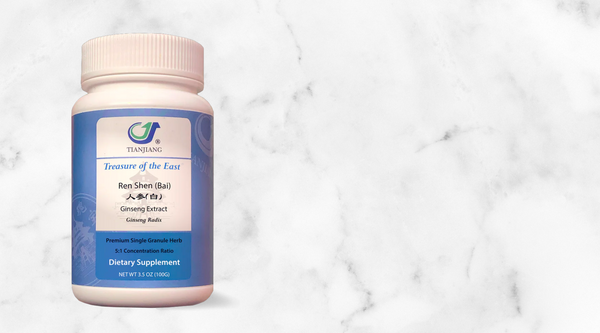
2. Huang Qi (Astragalus)
Huang Qi, or Astragalus, is renowned for its immune-boosting and longevity-enhancing properties.
In TCM, Huang Qi is classified as a warm and sweet herb that raises and tonifies Qi. It primarily targets the spleen and lung to stimulate vital energy flow, reinforce Wei Qi (defensive energy), and promote the production of body fluids. Together these actions contribute to overall health and vitality.
3. Dang Shen (Codonopsis)
Dang Shen, also known as Codonopsis pilosula, is revered for its energy-boosting properties.
Dang Shen is believed to replenish Qi, fortify the spleen and lungs, and strengthen the immune system. These aspects all contribute to improving overall stamina, vitality and resilience.
4. Ci Wu Jia (Eleuthero, Siberian Ginseng)
Ci Wu Jia is a robust Qi tonic. A warming herb with a sweet and slightly bitter nature, Ci Wu Jia is primarily used to tonify Spleen and Kidney Yang. The herb is effective in dispelling dampness, improving Qi deficiency, and may support Jing (essence). Its action of invigorating Qi, coupled with its warming effect, may enhance overall energy and physical stamina.
5. Ling Zhi (Reishi)
Ling Zhi (Reishi) is highly regarded in Traditional Chinese Medicine (TCM) as a longevity and vitality tonic. It is classified as sweet and neutral in flavor, allowing it to nourish Qi without overexciting the system. In TCM terms, Reishi strengthens the Wei Qi (defensive energy), fortifies the Shen (spirit/mind), and replenishes the Jing (essence). Regular intake of Ling Zhi is believed to strengthen vital energy and promote longevity.
6. Chong Cao (Cordyceps)
Chong Cao (Cordyceps) is a prized Yin and Yang tonic. Sweet and warm in nature, Chong Cao is believed to replenish the essence and invigorate Qi. Chong Cao is frequently used to minimize fatigue and boost physical stamina. TCM describes this effect through its traditional function of strengthening the Lung and Kidney systems.
7. Tai Zi Shen (Pseudostellaria Root)
Tai Zi Shen is a Qi tonic that is sweet and neutral, with an affinity for the spleen and lung meridians. Tai Zi Shen is said to invigorate the spleen, nourish Qi, and engender fluids. It reinforces the spleen to restore energy, supplement the Qi, and assist in the dispersion of heat, thereby improving overall vitality.
"Food As Medicine" Herbs for Energy
Three additional herbs for energy which may be enjoyed in everyday cooking or for snacking include Hei Zhi Ma, or black sesame seed (a Yin and Blood tonic); Gou Qi Zi, also known as goji berries, a widely recognized herb in TCM and now a popular health food snack; and Hu Tao Ren, or walnut, which is known for its ability to tonify qi, yang, and jing.
Chinese Herbal Formulas for Increasing Energy
Individual herbs for energy, such as those mentioned, are included in Chinese herbal formulas. These Chinese herbal formulas for energy work together to promote and restore energy, or Qi.
The ingredients in these formulas are chosen to enhance the effect of others, or to balance out certain properties, while others facilitate absorption. This holistic approach targets multiple health issues concurrently, with the goal of whole-body healing.
Let’s explore five popular formulas recommended by TCM practitioners to support energy.
1. Bu Zhong Yi Qi Tang (Middle Qi Tonifying Decoction)
Bu Zhong Yi Qi Tang addresses patterns of middle Qi deficiency and sinking Spleen Qi. Qi deficiency manifests as low energy levels, weakness, and susceptibility to disease.
Core ingredients of Bu Zhong Yi Qi Tang include Huang Qi (Astragalus) and Ren Shen (Ginseng). Known as powerful Qi tonics, these two herbs are believed to enhance energy levels while supporting the immune system.
Additionally, some herbs in this formula contain upbearing properties that help rectify sinking Spleen Qi, to address symptoms such as chronic diarrhea, fatigue, and weakness.
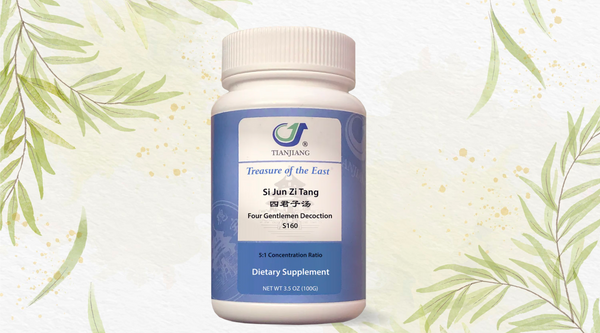
2. Si Jun Zi Tang (Four Gentlemen Decoction)
Si Jun Zi Tang is a classical formula in Traditional Chinese Medicine designed to strengthen Qi (life energy) and fortify the Spleen. It's often used for patterns of Spleen Qi Deficiency, characterized by symptoms including fatigue, poor appetite, and loose stools.
This formula is particularly beneficial for individuals with weak digestive systems or chronic fatigue. It works by enhancing energy production, improving digestion and absorption of nutrients via its tonifying and fortifying effects.
3. Shi Quan Da Bu Tang (Ginseng & Dang Gui Ten Combination)
Shi Quan Da Bu Tang is a modification of the popular formula, Si Wu Tang. Shi Quan Da Bu Tang, like Like Si Wu Tang, addresses Blood Deficiency patterns and is ideal for individuals experiencing symptoms such as anemia, dizziness, or pale complexion, which signal insufficient or stagnant blood flow.
The difference is the addition of warming and tonifying herbs to aid in dispelling cold and rejuvenating vital energy (Qi).
4. Liu Wei Di Huang Wan (“Longevity Blend” or Six-Ingredient Pill with Rehmannia)
Liu Wei Di Huang Wan is used for Kidney Yin Deficiency patterns, typically presenting as symptoms like hot flashes, tinnitus, or dizziness. Since these patterns are common in middle-age and elderly populations, Liu Wei Di Huang Wan is one of the most frequently used formulas in Chinese herbal medicine.
The formula’s energy-related properties are cooling and calming, as it works to nourish Yin energy, counterbalance excess Yang, and replenish vital Essence (Jing) to support kidney function and overall wellness.
5. Huan Shao Dan (Youth Return Formula)
Huan Shao Dan is commonly used to replenish kidney and spleen energy, and nourish the body's yin and blood. It is often recommended for individuals showing signs of spleen or kidney deficiency such as fatigue, low libido, and poor memory. Those with high-stress lifestyles or aging individuals benefit from Huan Shao Dan, by invigorating energy and replenishing vitality in the body.
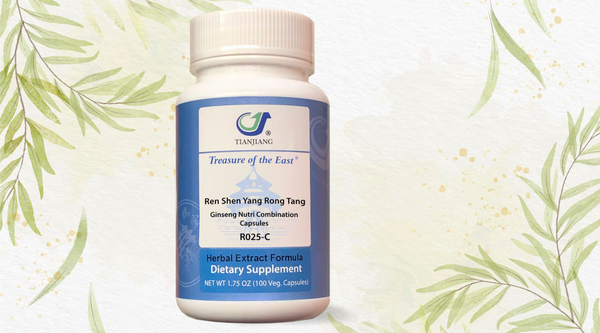
6. Ren Shen Yang Rong Tang (Ginseng Nutri Combination Formula)
Ren Shen Yang Rong Tang addresses patterns of Qi, Yang, heart and spleen Qi and blood deficiency – primarily due to overexertion. Typical symptoms include fatigue, poor appetite, weak pulse, and pale complexion.
Dang Gui (Chinese Angelica root) and Shu Di Huang (processed rehmannia root) play crucial roles in enriching the blood and nourishing Yin, to help regulate the body's energy balance.
This powerful and multi-pattern formula is believed to tonify Qi, nourish the blood, warm the Yang, strengthen the spleen and lungs, nourish the heart, and calm the Shen.
Lifestyle Tips for Boosting Energy
Fortunately, there’s a lot we can do to support healthy energy! We’d like to highlight four main areas in particular: nutrition, exercise, sleep, and stress management.
The importance of balanced nutrition
From a Traditional Chinese Medicine outlook, balanced nutrition holds the key to energy enhancement. TCM posits that every food carries a unique energy essence connected to specific organs. Hence, consuming a variety of foods aids in stimulating various organ systems, fostering equilibrium. This equilibrium leads to optimal energy flow, thereby boosting overall vitality. Therefore, ensure regular intake of diverse, nourishing foods to invigorate energy levels.
The advantages of regular exercise
In TCM, regular exercise improves Qi flow and removes blockages. It promotes balance between Yin and Yang, boosting vital energy. Exercise invigorates the lungs, aids digestion for better food Qi transformation, and augments heart Qi. This culminates to bolstered total body energy, improved resilience, and vitality. Prioritize exercises such as Qi Gong, Tai Chi, or yoga that emphasize slow, controlled movements and deep breathing.
The benefits of proper sleep hygiene
From a Traditional Chinese Medicine perspective, maintaining good sleep hygiene is vital for Qi — your body's vital life force. Quality sleep helps replenish Qi and promote healthy functioning of internal organs, leading to improved energy during the day. Disruptions in sleep interrupt this replenishment cycle, often resulting in fatigue. Therefore, prioritize a regular sleep schedule and conducive sleep environment for energy balance.
Stress management and its impact on energy
In Traditional Chinese Medicine, managing stress is key to maintaining optimal energy levels. Prolonged stress disrupts the flow of Qi (life energy), leading to energy depletion. Techniques such as meditation, acupuncture, and Qi Gong can restore this balance, enhancing energy and overall well-being.
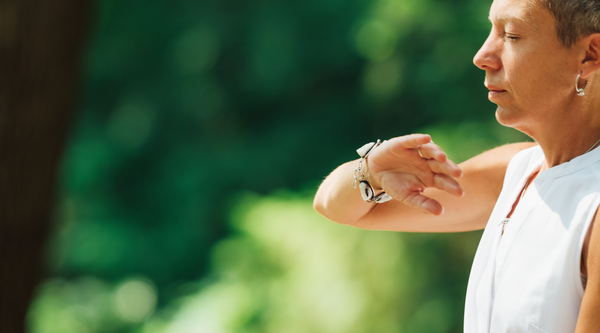
Conclusion
A well-rounded lifestyle that includes balanced nutrition, regular sleep, exercise and stress management, can often boost energy naturally.
For those suffering from debilitating fatigue, we recommend seeking guidance from your health care provider. A qualified practitioner of Traditional Chinese Medicine can be particularly helpful in recommending the appropriate herbs for energy, based on a holistic health evaluation.
Our wish is to empower TCM practitioners and their patients with premium-level Chinese herbs for boosting energy and vitality – safely and naturally.
Practitioners, did you know...? Treasure of the East’s full-spectrum extracts contain the same active chemical constituents as raw herbs! Register for a professional account today, or read on to discover all the benefits of including full-spectrum granules in your herbal pharmacy.
This article is provided only as an educational resource - it is not intended or implied to be a substitute for professional medical advice, and the herbs and/or formulas within are not intended to diagnose, treat, cure or prevent any diseases. This information is intended for only licensed healthcare practitioners.

